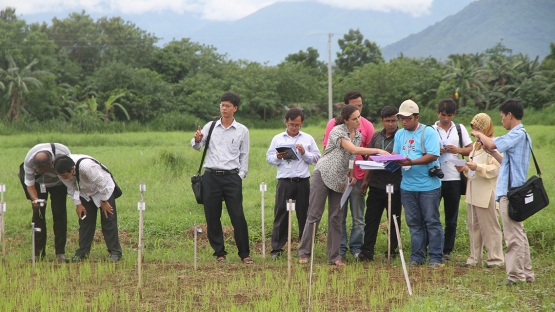The IAEA, the Food and Agriculture Organization of the United Nations (FAO) and the International Rice Research Institute (IRRI) have joined forces to enhance rice productivity, combining their expertise to develop sustainable rice production systems that will improve food security and farmers' livelihoods in the Asia and the Pacific region. The initiative brings together nuclear techniques for crop mutation induction (supported by the IAEA) and conventional methods that include molecular and bio-technologies (promoted by FAO and IRRI) in integrated packages supported by innovative management of soil, water and crop nutrients. The initiative also aims to develop improved rice varieties that are better able to adapt to climate variability and change, and to transfer these varieties efficiently to rice farmers.
Rice is the most important food crop in Asia and the Pacific region, and has an essential role in food security and sufficiency in the Asia and the Pacific region. Despite progress made in increasing yields, several biotic and abiotic factors continue to limit productivity. These include a lack of improved technologies and agriculture practices as well as the adverse impacts of climate change, including increased drought, soil salinity, temperature extremes and diseases and pests. Using crop mutation induction together with conventional and modern molecular tools for plant breeding supports the development and identification of crop varieties with higher adaptability to climate change and climate variability, and the selection of improved, more robust rice varieties with better yields.
In early July, the three organizations co-hosted a regional training course on advanced plant breeding techniques to enhance crop productivity and adaptability to climate change. The course was organized as part of the IAEA's regional technical cooperation (TC) project, 'Supporting Climate-Proofing Rice Production Systems (CRiPS) Based on Nuclear Applications'. Held at the IRRI headquarters in the Philippines, it was attended by 22 participants from 10 countries in the Asia and the Pacific region and 6 participants from Africa (sponsored by IRRI). The trainees included project counterparts, members of research groups and leaders of breeding programmes.
The training course offered a series of lectures, informing participants about the challenges of rice production, highlighting the current understanding of useful tolerance and adaption traits in rice crops, and underlining the fundamental role of nuclear techniques in the identification of climate change tolerant crop varieties. Participants took part in hands-on exercises, using various protocols and operating specialised equipment to assess various plant stresses and to accurately quantify plant responses as the basis for proper selection during germplasm improvement cycles. The second training course will be carried out in 2014 within the scope of the ongoing TC project.
The IAEA is not the lead organization in matters related to food and agriculture in the UN system, but nuclear technologies can be an essential component in food and agriculture projects. To make sure that the benefits of these technologies reach end users, partnerships with other organizations are essential. For this project, the activities of the IAEA, IRRI and FAO were ideally complementary, as each organization brought specific skills and technical expertise in the study of genotype and environment interactions.
By joining efforts, the IAEA, FAO and IRRI aim to ensure that rice scientists are acquainted with the most recent plant breeding and phenotyping approaches, allowing them to efficiently address future threats to food security stemming from climate change and other stress factors. The project also aims to act as a platform for future collaboration in rice production.
Joining Forces to Improve Rice Production in the Asia and the Pacific Region
02 Aug 2013

Related resources
More
Last update: 22 Jan 2018


